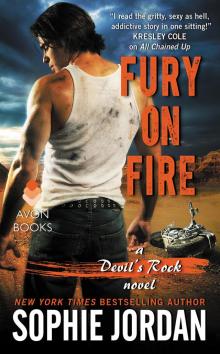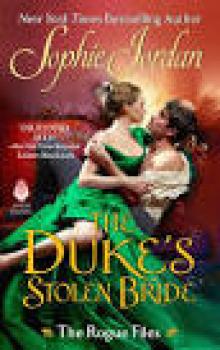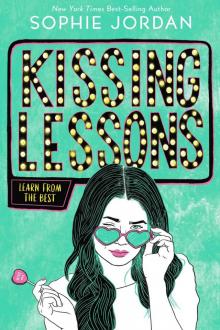- Home
- Sophie Jordan
Too Wicked to Tame Page 2
Too Wicked to Tame Read online
Page 2
“Where’s your driver?” he demanded.
“I haven’t the foggiest notion.” Portia lifted her impossibly heavy skirts and adopted her grandmother’s most officious tone. The one she used when addressing someone beneath her dignity. “Now, if you would be so kind as to step aside, I should like to reach the village before nightfall.”
He made no effort to oblige so Portia stepped around him and began sludging forward again.
“Wait,” he commanded. His large hand clamped down on her arm.
Portia glanced in surprise at the hard fingers encircling her arm. They were surprisingly long and elegant, blunt-tipped. She felt the burn of them through her cloak, into her very skin. Men didn’t touch her. Not voluntarily. None presumed such familiarity. She saw to that. Of course this stranger didn’t know that, didn’t know the rules that governed her.
Looking up into his face, she swallowed a small frission of alarm at how truly alone they were. How very much at his mercy she was. Swiping at the drooping brim of her bonnet, she said in her firmest voice, “Unhand me, sir.”
The sound of rain hitting earth and rock increased at that moment, a dull roar that filled their lapse in conversation. His image grew blurry—apart from his eyes. They glowed preternaturally, penetrating the gray screen of rain. “You’re a fierce thing, aren’t you, little Miss Mud Pie?” his disembodied voice taunted.
Fierce? Never had anyone described her as fierce. Capricious. Eccentric. Even odd. But never fierce. Portia supposed she might be a little like her old dragon of a grandmother after all—perish the thought.
“You can’t walk to the village in this storm.” His head dipped, assessing her, and she shuddered to think of the picture she made. Almost on cue, the wind picked up, nearly knocking her sideways.
He sighed and seemed to reach some sort of decision. Squaring those broad shoulders of his, he said, “I’ll take you there.”
“You?”
She blinked against the relentless rain and heard the smile in his voice as he replied, “Yes, me.”
Swiping again at her recalcitrant bonnet, she lifted her chin. “Why would I accept a ride from a self-proclaimed madman?”
His smile slipped and the hard look returned to his eyes. “Because you’ll reach the village in ten short minutes rather than the week it will take you on foot.”
Hmm. Sound logic for a madman. And truthfully, Portia was too miserable to refuse. Anything to reach shelter. Warmth. Dryness. Ground that didn’t shift and sink beneath her feet.
“Very well,” she declared, moving past him.
His stallion, hands taller than any horse she had ever mounted, eyed her suspiciously as she approached. Portia stopped, eyed the great beast in turn and wondered how she might mount without the aid of a step. An accomplished horse woman, she could usually mount unassisted, but not with wet, muddied skirts weighing her down and the spongy ground sucking hungrily at her boots.
She stepped closer, reaching for a handful of sable mane to pull herself atop. The stallion had other ideas. He dipped his head toward her with teeth bared. She jerked back, only barely avoiding the snapping jaws.
“Beast,” she cried, shocked and absurdly offended.
Hard hands grasped her waist and lifted her, securing her sideways atop the horse before she had a chance to protest. He swung up behind her, draping her legs over his thighs as if she were nothing more than a cloth doll to be neatly maneuvered.
Heat rushed her face. Settled snugly against him, she recovered her tongue. “W-what are you doing?” she sputtered. Who would have imagined that she, Lady Portia Derring, renowned bluestocking and spinster, would find herself in such an improper position? And with such a virile man?
The stallion craned his neck and tried to take another hunk out of her leg.
“Stop that, you devil,” she hissed.
“Iago doesn’t care for females.”
Iago? How fitting. The beast would be named after one of Shakespeare’s most villainous characters.
“Well, would you mind having a word with him?” she asked as she dodged another nip. “Before he cripples me?”
“No need for that,” he replied.
Portia opened her mouth to disagree, but he kicked the horse into motion, forcing Iago’s attention away from making a meal of her leg. The sudden movement also sent her rocking against him. He looped an arm around her waist.
“What are you doing?” she demanded.
“Delivering you safely to the village.” His warm breath fanned her ear. A bolt of awareness shot through her and her breath caught. “Never let it be said I’m not a gentleman.”
She snorted. A gentleman would not ride in the midst of a storm with no thought for life and limb. Nor would he toss her about as if she were a sack of grain. Nor press himself so intimately against her.
True, he possessed a fine horse and cultured speech, but his manners were coarse, his clothing plain, his hair too long, and there was something uncivilized about him. Something raw, elemental, as wild as the rough-hewn land surrounding them. More than likely he was a rustic squire unaccustomed to polite society.
Biting her lip, she told herself not to behave like a simpering miss. The type she rolled her eyes at every Season. Of course she would have to sit closely to him in order to share a mount. Desperate circumstances called for desperate measures.
Closing her eyes, she tried to ignore the firm chest at her back, the hard thighs beneath her. The solid arm holding her close. A slow trembling stole over her.
“You’re cold,” his husky voice sounded in her ear, and he drew her closer, folding her into him and wrapping his cloak about the two of them, cocooning them together. Far more courtesy than she would have ascribed to the snarling wild man he had first appeared. “You have no business being out in this weather.”
She stiffened in his arms, not caring for his chastisement.
“You could catch ill,” he added.
“I didn’t plan on getting caught in a storm,” she retorted, “but I’m hardly a frail creature.” Indeed not. She stood taller than most of her would-be suitors, was only thin and lacking in feminine curves—as Grandmother frequently criticized. “I have a healthy constitution. A bit of rain won’t hurt me.”
“In case you haven’t noticed, this is more than a bit of rain.”
“Wet and miserable as I am, it’s hard to ignore.”
“Then you should have—”
She twisted her head around, snapping, “I don’t need a lecture from someone who can’t exercise simple caution when riding his horse.”
Portia faced front again, leaning forward as much as she could, too annoyed to let herself relax against his chest.
Silence fell. No sound could be heard save the loud pelting of rain and sucking sound of hooves as they lifted from the quagmire beneath them.
He tugged at her waist, forcing her back against him. “What’s your name?” he asked, his voice grudging, as if he resented asking, resented wanting to know.
She answered in an equally grudging voice, “Portia.”
No more than that. No need for him to know that a duke’s daughter sat on his lap. Soon they would part company, never to set eyes on each other again.
“Portia,” he replied slowly, drawing out her name as if he tasted it on his tongue. “Different.”
“My mother named me after Portia in Merchant of Venice…or Hamlet, depending what day you spoke with her…and her mood…and whether or not I happened to be in her favor at the time.” She couldn’t keep the bitterness from creeping into her voice. Thoughts of her mother did that to her, even when she willed them not to. Frowning, she wondered why she had volunteered so much to him. An uncouth stranger.
“Not from these parts, are you, Portia?” he asked dryly.
Ignoring his bold usage of her name, she suppressed her impulse to ask after his name and turned her gaze to the rain-soaked terrain, both wild and beautiful.
“No,” she answered. Not that sh
e would mind staying. Even awash in rain, this rugged land appealed to her. But this was no holiday. She had a potential husband to scare off—a task at which she particularly excelled. She need only open her mouth and expound at length upon what ever text she currently read. Be it an ancient treatise on Roman engineering, a dramatic work of Sophocles, or the latest commentary on female rights, no one chased away a prospective suitor better.
“London?” he asked, his voice knowing, derision lacing his gravelly tones.
“Obvious, is it?”
“You’re not like chits in these parts.”
If she had been inclined, she could have told him she wasn’t like London ladies either. Vowing never to be auctioned off in matrimony like a cow at market set her apart from the rest of the herd. Not such a difficult task, she had discovered. No one wanted an impoverished bluestocking—even one with an excellent pedigree.
“Indeed,” she replied stiffly, certain he did not mean to compliment her.
“Indeed,” he echoed, laughter lacing his voice. “Never met someone so haughty.”
“Haughty?” she cried. “That’s rich. Especially coming from an arrogant brute like you.”
“God, you are a shrew,” he chuckled against her ear, the sound oddly pleasant.
“Because I do not take insults kindly?”
“No, because nothing but vinegar flows from your lips.”
“Then I shall spare you further ridiculous conversation,” she retorted, hot indignation stinging her cheeks.
He chuckled again, the sound rich and throaty as he pulled her even closer. His hand shifted, sliding beneath her cloak to splay against her rib cage indecently. A circumstance she might have objected to could she break her self-imposed vow and speak. Instead, she endured his nearness in silence and denied that her heart raced at the feel of his big hand resting scant inches from her breast—denied that his touch sent waves of heat through her otherwise freezing body.
Iago trudged along at a sedate pace, stumbling occasionally in one of the many water-filled ruts in the road. Distant cracks of thunder shook the air. The din agitated Iago, eliciting distressed whinnies.
Behind her, his deep voice hummed gentle murmurings to the volatile stallion and did strange things to her insides.
“Something tells me you’re unaccustomed to holding your tongue.”
She jumped, taken aback at the sound of that velvet voice addressing her and not the horse.
“I don’t mind. Talk,” he murmured and his hand moved again, closer to her breast, his thumb almost grazing the underside. “I enjoy listening to your voice. So proper. Clipped but soft. Almost breathless, like your corset’s laced too tight.”
Portia sputtered. Heat scalded her face all the way to the roots of her hair. He dared make mention of her undergarments? Her outrage mounted as he added, “You know, I could loosen it for you.”
“You—you beast!” she cried, struggling out of the shelter of his cloak.
Iago stepped into another rut and they plunged off balance. Portia shrieked and slid off his lap, nearly plummeting to the ground below. A firm arm wrapped around her middle. She dug her fingers into a taut, straining forearm.
“Stop your caterwauling,” his harsh command rang out. “You’re frightening the bloody horse!”
Biting her lip against another scream, her fingers clawed their way up his forearm to his biceps, desperate to keep from falling. Suddenly the horse reared.
And she was falling. With him. Her fingers didn’t release their death grip on his arm as they tumbled to the ground in a tangle of limbs.
Chapter 3
For a long moment, Portia didn’t move a muscle—couldn’t. Partly due to the large man sprawled atop her, and partly due to the shock of finding herself submerged in mud. Again. At this point, she wondered if she would ever be clean and dry again. Muck coated every last inch of her.
Turning her head, she watched the horse flee down the road, reins whipping wildly in the wind. “Where’s he going?”
“Home.”
“Home,” she echoed, looking up at him.
His face hovered above hers, the chill of his ice-gray eyes the only color in his mud-covered face. If possible, those eyes made her even colder.
“Yes, several miles from here,” he bit out.
“Oh, brilliant,” she exclaimed. “Splendid horse you have there!”
“Nothing is wrong with Iago.”
“No?” she countered, feeling herself start to shake with rage. “He abandoned us.”
“With a shrieking witch on his back, I can hardly blame him.”
“What kind of horse can’t withstand a little noise? A first-rate mount can ride into battle with cannons firing—”
“A cannon, he could tolerate. A loud-mouthed shrew is another matter.”
Chest heaving, she shoved at the big body covering hers. The action forced her deeper into the wet, yielding earth. “Care to get off me?”
“With plea sure,” he spit out, pushing to his feet.
It was with some satisfaction that she saw he was as filthy as she. He speared her one last fulminating look before turning and stalking away.
“Where are you going?” she shouted, struggling gracelessly to her feet—nearly falling back down when her right ankle collapsed under her weight. Her mouth opened wide on a silent cry. She quickly shifted the bulk of her weight to her left ankle and hopped until she steadied herself.
“The blacksmith can loan me a horse,” he called over his shoulder without breaking stride.
Lifting her impossibly heavy skirts, she drew a deep breath and stepped forward—or rather, limped—determined to keep up and not humiliate herself by falling again. Not an easy task. Especially with her ankle throbbing inside her boot.
Wincing, she stifled her pain and worked hard to keep up. Her breath fell hard and fast as she moved her legs. The throb in her ankle intensified, each footfall a bolt of agony.
His figure grew farther and farther away. He was leaving me.
Her eyes burned. A deep sob welled up in her chest and she fought to keep up. She gulped air, determined to swallow back the tears. I will not cry. I will not cry.
And in that moment, she felt crushed, beaten by life—her family, the mother whose letters were rare and few between, the cloud of poverty that perpetually hung over her, shadowing her every move and breath. And now him. A brute that didn’t care if he left her to drown in mud and rain.
The sting in her eyes intensified. Yet she’d be damned if she cried. If she succumbed to weakness. She stopped abruptly. Tilting her face to the sky, she let the deluge of rain wash over her, cooling her burning emotions.
“Keep up,” he called.
She dropped her head to glare at his back, wanting to lash out. To hurt. To weep uncontrollably. And that, she absolutely refused to do.
Instead, she dropped where she stood in the middle of the road like a heavy stone sinking to the bottom of a riverbed. Uncaring of her muddied gloves—what part of her wasn’t covered in filth?—she buried her face in her hands.
And laughed.
Brittle, shaky laughter rose from deep in her chest. Laughter that she knew could change at any given moment and swing into humiliating tears if she weren’t careful. Busy on keeping those tears at bay, she did not hear him approach. Through parted fingers, she saw his boots stop in front of her. Her chest stilled, all laughter gone. With an odd sort of detachment, she studied the rivulets of water running down the gleaming length of his boots.
Dropping her hands, she scanned the long length of his body, her eyes stopping at his face, expecting to see condemnation there—unforgiving reproof for being weak and lagging so far behind.
He gazed down at her blankly, not a flicker of emotion on his stone-carved face. Sighing heavily, he leaned down and reached for her arm.
She slapped at his hand.
Frowning, he went for her arm again.
Again she slapped at his offending hand—this time with m
ore force.
“I can make my own way,” she grumbled, determined to accept nothing from him. “Go on without me.”
His nostrils flared, his lips flattening into an unrelenting line. A warning she had no time to heed. In one swift, fluid motion, he bent, slid an arm under her knees, and swept her up into his arms as if she weighed a feather. Shocked, she didn’t even struggle as he cradled her close to his chest. His long-legged strides cut through the road with seeming ease.
“I can walk,” she muttered, holding her arms awkwardly in front of her, wondering where to put them.
“Of course you can,” he returned, not looking at her, simply staring ahead, unblinking against the steady fall of rain.
Giving up, she slid one arm around his broad shoulder, her fingers resting lightly at his nape, beneath the too-long strands of hair. His dark hair fell over her fingers and she fought the urge to stroke the rain-slicked strands. Her other hand relaxed against his chest, where the steady thud of his heart beat against her palm.
She studied his profile for a moment, her anger fading as he carried her forth so stalwartly. Suddenly he looked down, his eyes locking with hers. This close she could see the dark ring of blue surrounding his gray irises. Something strange and foreign swelled to life in her chest, trapping her breath deep in her lungs like a bird caged—just as those intense eyes of his trapped her.
Perhaps he wasn’t such a brute. A brute would have left her behind instead of sweeping her into his arms like some kind of hero from Arthurian legend.
She gave herself a hard mental shake, reminding herself that those were legends, stories her mother had read to her as a girl. Real knights in shining armor existed only in fairy tales.
A relieved breath escaped her chest when the village came into sight—an assortment of several thatch-roofed cottages, a small stone church, a blacksmith’s barn and a large two-story inn that leaned ever so slightly to the left. The cottages, hunkered shapes that seemed to tremble in the biting wind, lured her like a first edition copy of Mrs. Wollstonecraft’s A Vindication on the Rights of Woman.

 Uninvited
Uninvited The Duke Buys a Bride
The Duke Buys a Bride Hidden
Hidden Breathless
Breathless Hell Breaks Loose
Hell Breaks Loose Wicked in Your Arms
Wicked in Your Arms The Earl in My Bed
The Earl in My Bed All the Ways to Ruin a Rogue
All the Ways to Ruin a Rogue Sins of a Wicked Duke
Sins of a Wicked Duke Beautiful Lawman
Beautiful Lawman Once Upon a Wedding Night
Once Upon a Wedding Night In Scandal They Wed
In Scandal They Wed Vanish
Vanish Rise of Fire
Rise of Fire Firelight
Firelight An Heiress for All Seasons
An Heiress for All Seasons A Good Debutante's Guide to Ruin
A Good Debutante's Guide to Ruin Fury on Fire
Fury on Fire All Chained Up
All Chained Up Foreplay
Foreplay The Scandal of It All
The Scandal of It All The Duke's Stolen Bride
The Duke's Stolen Bride Unleashed
Unleashed Reign of Shadows
Reign of Shadows The Me I Meant to Be
The Me I Meant to Be One Night With You
One Night With You How to Lose a Bride in One Night
How to Lose a Bride in One Night Tease
Tease Kissing Lessons
Kissing Lessons While the Duke Was Sleeping
While the Duke Was Sleeping Wild
Wild This Scot of Mine
This Scot of Mine Foreplay: The Ivy Chronicles
Foreplay: The Ivy Chronicles Firelight with Bonus Material
Firelight with Bonus Material The Duke Goes Down
The Duke Goes Down All The Ways To Ruin A Rogue (The Debutante Files Book 2)
All The Ways To Ruin A Rogue (The Debutante Files Book 2) Wicked Nights with a Lover
Wicked Nights with a Lover Firelight f-1
Firelight f-1 Beautiful Sinner
Beautiful Sinner Surrender to Me
Surrender to Me Scandal of It All
Scandal of It All Vanish f-2
Vanish f-2 Vanish: A Firelight Novel
Vanish: A Firelight Novel The Earl in My Bed: A Forgotten Princesses Valentine Novella
The Earl in My Bed: A Forgotten Princesses Valentine Novella